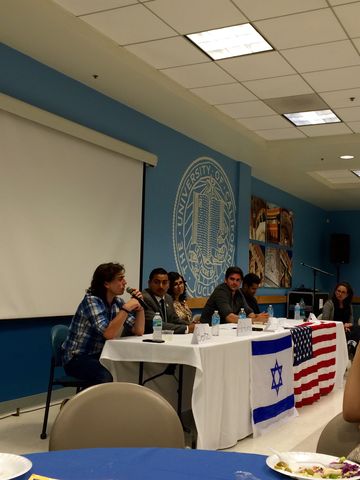Three Israelis and two Americans sat before a crowd of eager listeners in the Bruin Reception Room for a “Night of Unity,” an event hosted by Students Supporting Israel (SSI) and co-sponsored by nine other UCLA-affiliated organizations. Though different in their backgrounds and upbringing, each of the panelists shared an identity as veterans, equipped with unique stories and experiences from their time in service.
Those in attendance munched on falafel sandwiches while moderator Tali Moore asked the panelists questions for the opening discussion. The veterans hosting this evening were former US Marine Arturo Flores, UCLA Hillel’s Jewish Agency Israel Fellow Lipaz Ela, IDF veterans Bentzi and Alon (surnames not shared) and US Navy veteran Johnney Maldonado.
The common theme among the Israeli veterans was a heightened sense of community in their military obligation, since all Israelis are drafted into the army at the age of 18. Stroking his long hair, which he grew out after “five years of buzzcuts,” Bentzi noted that “since everyone’s going through [the IDF], it makes it easier.” Bentzi immigrated to Israel from New York at the age of one and served in two operations in Gaza, including Operation Protective Edge.
Both American and Israeli veterans agreed that one of the most difficult challenges of service was being away from home while life seemed to go on without them, and even after transitioning into society, they can never fully rid themselves of the military mindset — especially with friends and family still deployed. On the other hand, it was also very rewarding to have the opportunity to serve their country, supporting their fellow soldiers in the process.
At 19, Ela was assigned to be a commander to a troop of soldiers, none of whom were more than a year younger than she. She recalled giving a second chance to an 18-year-old soldier who suffered a mental breakdown during guard duty after realizing his utter loneliness after a lifetime of caring for his family. Once a negligent soldier, a year and a half later he was a changed man, and was awarded an honors pin for his contributions to the army.
One of Flores’ takeaways from service was his ability to engage with people on a personal level, while the media seems to dehumanize those in the military. Now the president of the Student Veterans of America at UCLA, he, along with vice-president Maldonado, provides resources for veterans while educating others about US military life. You may also find them in the halls of UCLA as they pursue degrees in Political Science.
One interesting difference between the Israelis and Americans was their response to what lessons they learned from their service. While Ela emphasized the importance of camaraderie and of being accountable for fellow soldiers, Flores stressed that “you should always take care of yourself and put yourself before everything else.” However, Flores justified this statement by saying that “you have to be able to help yourself before helping anyone else.”
One strong and rather surprising point of agreement among the panelists was the characterization of soldiers in the news versus the reality of soldier-enemy relations. In the words of Bentzi, “We have more in common with our enemies than we think,” and we share many of the same values with countries with which we go to war.
The question-and-answer portion of the event allowed audience-members to ask their own questions of the panelists, which resulted in an intriguing discussion of the issue of mental health in the military. Alon explained that part of his duty as a commander was to provide resources to soldiers in need. “We’re parents, we’re older brothers, we’re babysitters, we’re everything,” Alon said. Still, as Flores described, seeking resources in the US military has a social stigma attached for fear of being labeled weak. This issue is something our country is working to mitigate.
Both Flores and Alon related the topic of mental health to the students in the audience. While earning one’s college degree may appear to be of exceeding importance to us undergraduates, Flores stressed not to “put any inanimate object before yourself, your mental and your spiritual health.” Similarly, to Alon, the determination and effort he learned from the army may be applied to one’s studies. This was one of the many valuable life lessons he retained from his service in the IDF.
At the conclusion of the program, I spoke with SSI board member and fourth-year Physics major Tianyi Ge about his family’s personal connection to some of the stories shared by the panelists. Rather than putting his law degree to use straight after graduating college in Shanghai, China, Ge’s father decided to serve 10 years in the military. “His sacrifice for his country really resonates with what I see here today with the Israelis presenting their stories,” Ge said.
Whether American, Israeli or Chinese, veterans of all nations share a common struggle and a common bond. Sharing his thoughts on the event, Maldonado said, “I think we learned a lot from each other, but I can look at any other veteran and they understand and have the same sense of camaraderie and family… regardless of country.”
Furthermore, while film and television bombard us with images of military life, Maldonado brought up the need for a counter-narrative. “Violence means we’re away from our family, we’re away from our friends, so being in the military, we want to promote peace more than others,” he said.
Flores agreed with the necessity of breaking the stigmas and misconceptions about the military currently in place, stating that whether or not a soldier’s personal ideals align with those of one’s country, the soldier’s ultimate duty is to protect the citizens. Nations often face criticism for their actions in times of war, but as Flores said, “America is not perfect, and Israel is not perfect — because we are human.”

